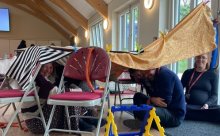

I began my week in Pre-Prep immersed in an inspiring training session led by Ben Kingston-Hughes, which centred on the critical role of play in children’s development. Attended by a number of local Pre-Schools as well as some of our teaching staff, the annual Nursery Heads’ Conference, hosted by Moulsford, also explored the importance of Mathematics in the early years and provided fascinating insights into the neuroscience of stress and pressure in children. With the assessment period approaching, now is a timely opportunity to consider how parents can support their children’s well-being during what can be a challenging time of year.
Stress affects everyone differently and for some children assessments can feel particularly daunting. However, with the right routines and strategies in place, children can approach exams with confidence and calm. At Moulsford, our informal assessments for Years 3–7 are designed to inform the curriculum for the year ahead. Pupils are guided through the process in a supportive, relaxed environment and are well-prepared in the preceding weeks through their lessons.
Ben Kingston-Hughes spoke extensively about how children learn most effectively. One key point he emphasised was the value of regular physical activity, not only for physical health but also for brain development. At Moulsford, children are fortunate to experience a wide range of sports and activities which help nurture a love for being active. When children engage in exercise, their brains release chemicals like dopamine and BDNF (brain-derived neurotrophic factor), which help form stronger neural connections improving memory, focus and emotional regulation. Just 20 minutes of walking or playing sports can boost mood and concentration, making learning more effective.
When it comes to revision, breaking study time into manageable chunks with short, regular breaks (known as “chunking”) is far more effective than long, uninterrupted sessions. Adequate rest is essential for memory consolidation so don’t underestimate the value of a proper pause. Techniques such as using flashcards, quizzes, and mixing up subjects can help keep children engaged. Encouraging active recall (retrieving information without notes) is more effective than passive review and one of the most powerful ways to consolidate learning is by having your child explain what they’ve learned to someone else. These are all techniques which Moulsford staff suggest and explain to pupils in general, with reminders in the run up to assessments.
Sleep is another vital component of exam readiness. Children need between 9 and 11 hours of sleep each night. This is not just to rest but because the brain processes and stores information during sleep. Late nights revising may feel productive, but they can actually impair memory and focus. Parents can support good sleep habits by encouraging consistent bedtime routines and reducing screen time before bed.
It’s entirely normal for children to feel nervous before assessments. The goal is not to eliminate those feelings but to help them manage them. Techniques like “box breathing” (inhale for 4 seconds, hold for 4, exhale for 4) can be helpful. Encouraging open conversations about their feelings, whether with you, their form tutor, or a friend and reminding them that assessments are just one way to demonstrate what they know can help. Assessments are a key part of children learning how to cope with stress and do not define their worth.
Ultimately, being a steady and supportive presence is the most valuable thing you can offer. Check in regularly, offer reassurance and celebrate effort over outcomes. With parents and school combining emotional support with practical strategies, we can help children approach assessments with resilience, confidence and a healthy perspective, skills that will serve them well far beyond the classroom.
Caroline Scriven
#MPSHeadsBlog





























